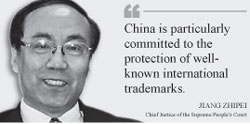overseas companies are confident in the chinese legal system's ability to protect their registered brands and trademarks in the domestic market, says a senior official of the supreme people's court (spc).
china is particularly committed to the protection of well-known international trademarks, jiang zhipei, chief justice of the spc's ipr tribunal, said during a recent high-level conference of legal officials.
the country abides by the paris convention for the protection of industrial property, which has been enshrined in china's trademark law and the spc's judicial reviews.
"overseas companies will enjoy the same 'national treatment' as domestic trademark owners, so long as they abide by the above laws and interpretations," says the senior court official. 
"they have access to protection across all categories, although the first step is to register their trademarks immediately upon entering the chinese market."
once a trademark infringement is detected, the overseas owner of the trademark can lodge a complaint with china's trademark bureaus and commerce administration, or appeal to the court for affirmation of the market status of their trademark.
the chinese trademark law was enacted in 1982 and revised in 1993 and 2001. it states that the best proofs of "well-known trademarks" in ipr-related disputes include demonstrations of consistency in use and consumer awareness, promotional efforts and records of protection.
protection is also available in instances where the owner uses the trademark in more than one industry or another party uses the trademark in an internet domain, says cao jianming, vice-president of spc.
according to him, similar principles are applied to brand names and internet domain names.
when considering cases of cross-industry trademark affirmation, "courts should come to rational conclusions according to the trademark's reputation, prominence and the negative consequences of its 'infringement', and the protection cannot be used in unprincipled ways."
in the meantime, cao adds, it is important to take precautions to prevent companies from deliberately creating trademark disputes as a means to boost the profile of their previously obscure products.
"if it can be proven that a party is deliberately creating a dispute, they will be be punished according to the civil law, which will hold them accountable for breach of civil lawsuits," says cao. "the original trial results and well-known trademark affirmation should also be cancelled."
 the trademark law requires that a thorough investigation be conducted before a well-known trademark can be affirmed. this tenet of the law aims at preventing "unilateral or isolated judgments," says cao.
the trademark law requires that a thorough investigation be conducted before a well-known trademark can be affirmed. this tenet of the law aims at preventing "unilateral or isolated judgments," says cao.
"to be affirmed, the well-known trademark should at least in most domestic markets enjoy high market reputation and be established as quite familiar among the public. detailed proof shall not be required in cases dealing with trademarks already known across the globe."
spc also emphasizes its application of a strict well-know trademark record system.
"various levels of courts must immediately report to the spc's archive once a well-known trademark is affirmed and the verdict takes effect."
spc statistics show that from 2002 to october 2006, chinese courts affirmed 187 trademarks as "well-known". among these, 12 were foreign trademarks.
at the same time, the state administration for industry and commerce (saic), a government agency in charge of overseeing the enforcement of market order, is investigating many more trademark violations.
in 2005 alone, its national system handled 49,412 trademark infringements and counterfeiting cases. among these, 6,770 involved overseas trademarks.
among the 17 largest ipr cases beijing no 1 intermediate people's court handled in 2006, england's premier league won a trademark dispute over the chinese sporting events company xiangshi celebration service company, in xuzhou, jiangsu province. in 1999, the chinese company had registered as its trademark an image of a lion, which closely resembled that used by the premier league. the difference was that the xiangshi lion did not clutch a football with its right paw. the court concluded that xiangshi should stop using its logo, because it was too similar to the premier league's.
multinational pharmaceutical giant pfizer inc filed one of the 10 most important ipr complaints.
the beijing court ordered beijing health new concept pharmacy co and lianhuan pharmaceutical co, based in eastern china's jiangsu province, to halt sales of their blue pills, which closely resembled viagra in appearance. lianhuan was also ordered to pay pfizer 300,000 yuan in compensation.
"the victory is a test of china's willingness to protect patents, copyrights and trademarks, and we warmly welcome this verdict," says a press officer with pfizer (china).
he says pfizer is "very much encouraged" by china's enforcement of its ipr law.
(china daily 02/10/2007 page9)

